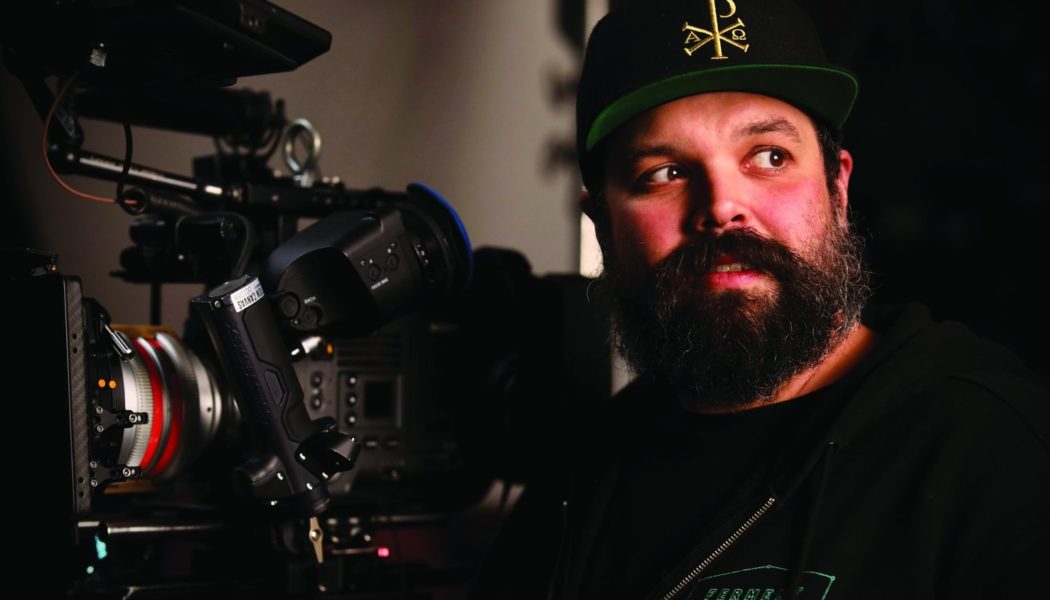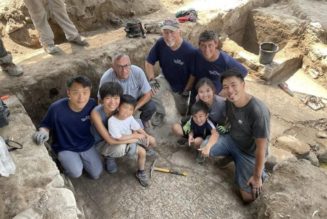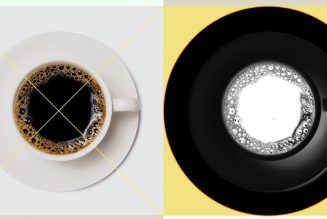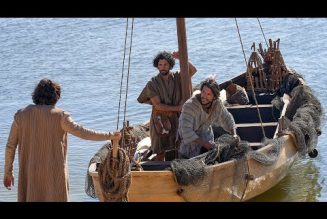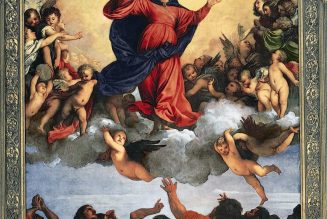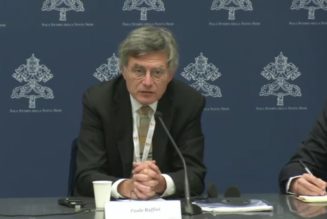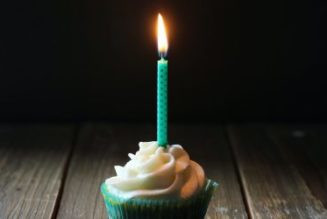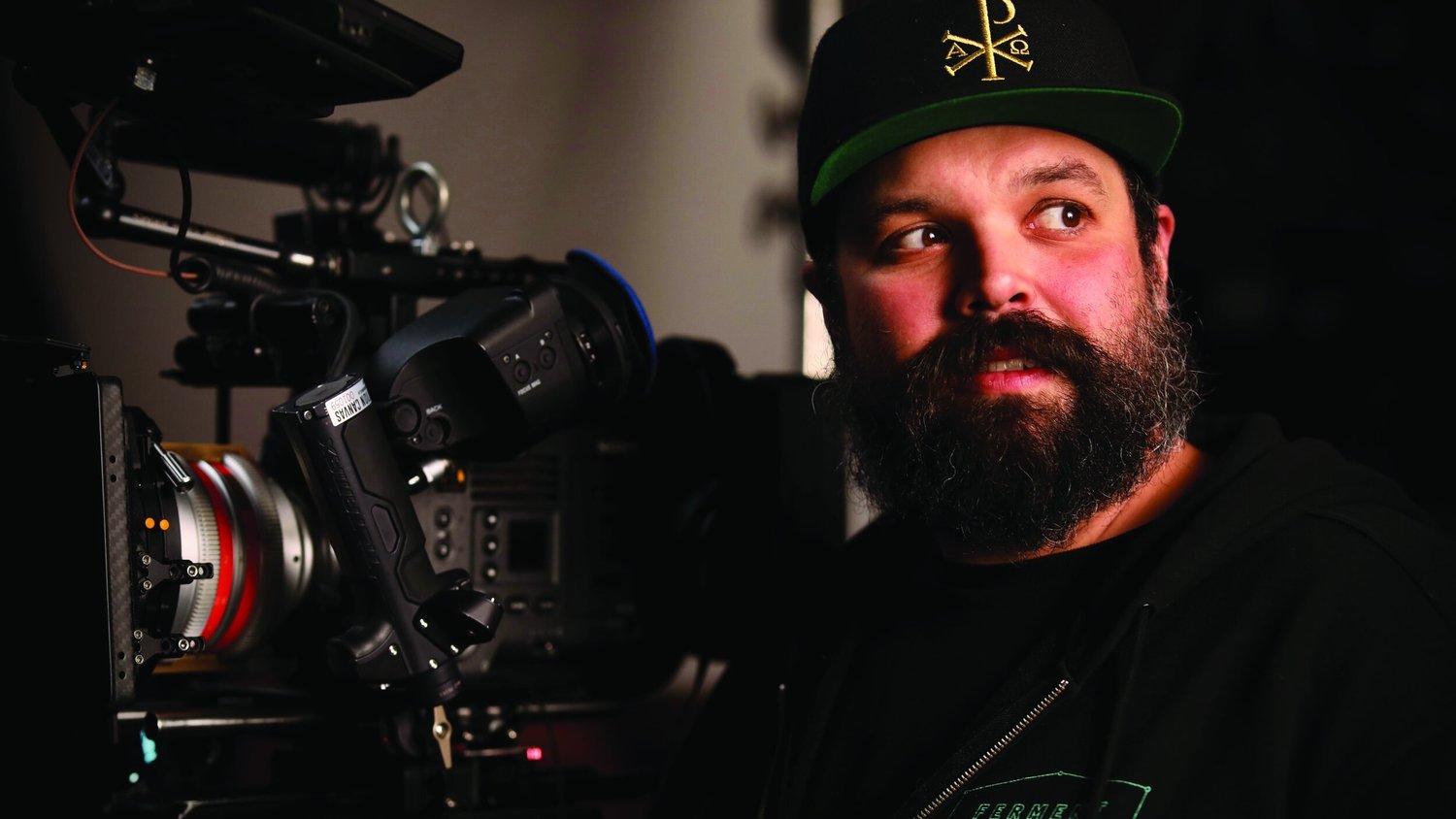
by Blair Gordy Piras
Manny, tell us about yourself. Who are you, how did you get into filmmaking, and what have been some major turning points in your career?
My name is Manny Marquez. I grew up in Tulsa, Oklahoma. As a child, I fell in love with storytelling and loved to read. Of course, being Catholic, there were so many great stories we’d hear of the saints and the life of Christ in the Gospel. Those made a huge impact on me. Also, I am part Native American, a member of the Choctaw Nation of Oklahoma. I can remember my paternal grandmother, where we get our Native heritage, was very much a storyteller and was always spinning yarns for us grandchildren…mostly ghost stories.
When I was 7 years old, my parents gave me a Fisher Price 110 still photo camera for my birthday, and everything changed. No longer were my ideas confined to my limited knowledge of language—I could take pictures! Of course, my photos were horrible, but a spark for image making was born in me.
Now, my Uncle had always had an interest in special effects make-up. He had made make-ups from the Planet of the Apes, The Island of Dr. Moreau, Star Trek, American Werewolf in London, and many more. When I was small, he’d often make himself up and scare me and my cousins. Being the creative kid I was, I immediately connected to this art form and asked him to teach me. Seemed like a way to be closer, but at home. So, I was actually apprenticing to be a make-up artist with him. As I learned more and more about sculpting and painting, all necessary skills in the make-up trade, I found I was doing make-ups for my own short films. I had a real love of Star Trek: The Next Generation and was making up all my friends from school to act in my own homemade episodes. As we did more and more of these Star Trek films, I realized that I was no longer writing in the need for make-ups. I had fallen in love with writing and directing, back to my original love of being the storyteller.
As I reached college age, I had decided that I didn’t want to have the traditional university experience. Having been Catholic and creative in the Bible Belt, I felt I needed to go beyond what was on offer locally. I had contemplated the priesthood and also the military, but my heart was pulling me toward filmmaking. All I wanted was to tell stories and be behind the camera. I applied to the Art Center College of Design in Pasadena, CA. I was accepted using a film I made for my cinematography merit badge as my portfolio sample.
It was there that the world was opened up to me. I learned directing, cinematography, writing, and a myriad of other skills. I studied art history as well as media at all avenues. My science classes were all in relation to the arts too, raising and studying questions like what it is that the eye really sees. There was no fat to trim, just 100% art and film. I was surrounded by creativity. It was also the place that I started to lose my faith. There is a danger in the arts; if you allow it to do so, your creative practice can become your church. The world will tell you that your craft is the most important thing, and that your upbringing is holding you back. I don’t blame anyone at the school for that. I think my own ego took hold of my heart, and pushed my soul aside. Regardless, I excelled at film school and hit the industry with both feet on the ground.
I thought I was going to be a screenwriter, because I had a great mentorship with a very well known writer. I used to spend five hours per day writing on my own screenplays, but nothing I wrote ever broke out. I was still hoping to direct my own films, too, but started being known as the guy that all my friends’ bands could come to for a music video. I probably directed over 50 music videos in the Echo Park/Silver Lake area of Los Angeles in the early 2000’s, and I loved it. Even though I wasn’t doing exactly what I wanted, I was concepting and executing ideas, and on a budget. You learn a lot out of necessity, and I’ve been able to take that to my work these days.
Before long, I had to start working to survive the post-college high, and reality set in. I became a camera assistant on reality shows. I don’t want to sound ungrateful, because I was happy to have the work, but reality tv is the farthest thing from filmmaking, the thing I actually loved. It really was wearing. It was around that time that I went back to Oklahoma and visited that same uncle that taught me special effects make-up. Even though he was a garbage man by trade, he owned the business, and he still had a passion for special effects make-up. He took me out to a property he had just bought. 40 acres out in the woods, and he was going to transform this into his own haunted house theme park called Psycho Path.
My mind was reeling. I returned to Los Angeles and back to my camera assistant job, but I couldn’t stop thinking about the Psycho Path. My uncle had been facing push back from local officials, threats from neighbors to the park, and lack of support from his family. Yet, he was determined to live his dreams come Hell or high water (it was in a flood plain!). I gave my notice on the reality tv show, and I decided I was going to make a feature documentary about my uncle. In order for me to get out of the rut of not making a movie in Hollywood, I’d have to leave Hollywood to make it happen on my own.
During that time, I met a man named Barry Poltermann. He had been a commercial director himself, but was most known as the editor of the Sundance award winning documentary American Movie. Barry became my guide as I navigated making my first feature. He also was starting a company and recruiting documentary filmmakers to work for him. The idea was that we’d take our skill sets to commercial clients. For example, one project I got assigned to was a multiple part documentary series for Trek Bicycles at the 2009 Tour de France.
That series I shot at the Tour de France ended up being a massive turning point in my career. Over the course of 22 days, we made 20 short documentaries. When we came back to the States, those films became my main portfolio. That pretty much cemented my trajectory as a documentarian who would also work in the commercial realm.
Around that period, I had been away from the Catholic faith for about 10 years. My girlfriend (now my beautiful wife!) was talking about marriage, and I knew there were some big life changes I’d have to face. I decided that I had to have a conversation with Jesus. I needed to know if he was the son of God, or if I was free to pursue my life without him. So, I went to one of my favorite bars and ordered a pint. I said to Him, “Jesus, you and I are going to have a drink. I don’t know if I truly believe you’re the son of God, but if you are, I need you to tell me. I can’t walk away from you if you are the Truth.” I am not saying I heard voices or had a vision, but a calm came over me. In my mind, I felt he revealed that He was who He claimed to be, and I needed to follow Him. From that point on, I knew I was Catholic, and I came back into the Church with a converted heart. I wanted to embrace the Faith with everything I could and that included the work I was doing in film.
My feature film Psychopath about my uncle was finished in 2014. Despite spending so many years of my life on it, it didn’t land the way I had hoped. In fact, we never got distribution for it. I immediately started looking for my next story because I knew filmmaking was my vocation. My brother Anthony had served in the Marine Corps as a bomb dog handler. His dog, Allie, whom he deployed to Afghanistan with was facing the end of her military career, and was up for adoption. Anthony set out to adopt her and bring her home to Oklahoma. Operation Allie was the film that came out of that. This ended up being a short film, but an absolute turning point in my career. It was a hit at the documentary film festivals, and truly became a spotlight piece on my portfolio of the kind of storytelling I wanted to do.
In 2018, after a decade making my living off of documentary style marketing videos, I began to feel lost. That same feeling that had hit me while working in reality television was nagging at me. God gave me the ability and the drive to be a storyteller, but I was using that talent on financial films and pharmaceutical videos. Again, I am grateful for that work, but I needed to point some energy in a new direction. That is when I decided to contact Word on Fire.
I had accidentally discovered Bishop Barron on Youtube, because he had done a video on Terrence Malick’s The Tree of Life. There’s a priest on the internet that likes the movies I like? I couldn’t believe it! Then I saw he was a Bob Dylan fan, and a Coen Brothers fan, and he still was true to the Catholic faith. Bishop Barron’s engagement of the culture, rather than simply deriding that culture, came to me as a breath of fresh air.
Before I knew it, I was working on the Pivotal Players series. I had the great honor of being a part of the last four episodes that were made. Those featured Venerable Fulton Sheen, Flannery O’Connor, St. Ignatius of Loyola and Bartolomé de las Casas.
After that work, I was asked to travel to the Synod on Youth and documented Bishop Barron’s time there. Then, I directed a documentary for the release of the Word on Fire Bible: Volume II featuring designer and artist Michael Steven’s creation of a centerpiece painting for the Bible called The Pentecost (After Maíno). All of this led right up to my being asked to direct the series Wonder: The Harmony of Faith & Science.
What I’ve loved most about working with Word on Fire is that their mission reflects my beliefs while satisfying my creative drive to make art in the deepest sense of the word. You know, we all say we have a vocation in our art, but when you use it for the kind of work they are doing, the vocation fully comes alive.
As one of my favorite filmmakers, Andrei Tarkovsky, once said: “Art acts above all on the soul, shaping its spiritual structure.” I believe that is indeed the truth, and it also works in reverse. What we put forth in the spiritual life will shape the art we create. That is why it is imperative we fill our lives with the transcendentals of goodness, truth and beauty. If we do so, they will point our cameras, or paint brushes, and our hearts to Christ.
